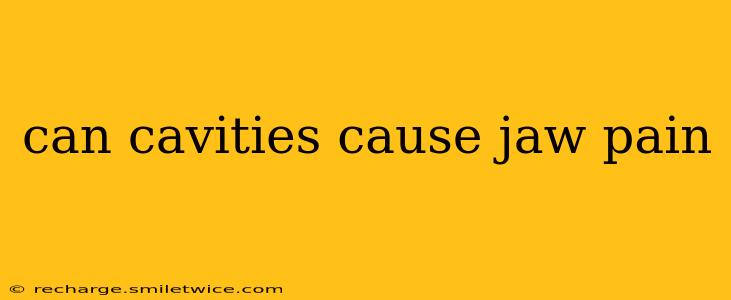Jaw pain is a common complaint, and while it's often associated with temporomandibular joint (TMJ) disorders, it can also be a symptom of dental problems, including cavities. While a cavity itself doesn't directly cause jaw pain, the complications arising from an untreated cavity can certainly lead to discomfort in the jaw and surrounding areas. Let's explore the connection between cavities and jaw pain in detail.
How Cavities Can Indirectly Cause Jaw Pain
Cavities, or dental caries, are holes in the tooth enamel caused by bacteria that feed on sugar. Left untreated, these cavities can progress, leading to several problems that can contribute to jaw pain:
-
Infection: A significant cavity can infect the pulp (the inner part of the tooth containing nerves and blood vessels). This infection can spread to the surrounding tissues, causing inflammation and pain that can radiate to the jaw. The pressure from the infection itself can also be a source of discomfort.
-
Abscess: A severe infection can result in an abscess – a pocket of pus that forms at the root of the tooth. This abscess can exert significant pressure on the jawbone, leading to intense, throbbing pain.
-
Sinusitis: In some cases, severe upper molar infections can spread to the sinuses. Sinusitis, or sinus infection, can cause facial and jaw pain as well as other symptoms like nasal congestion and headache.
-
Temporomandibular Joint (TMJ) Dysfunction: While not a direct cause, chronic or severe tooth pain from untreated cavities can lead to changes in your chewing habits, potentially exacerbating or causing TMJ dysfunction. This can manifest as jaw pain, clicking, or locking of the jaw.
Can a Small Cavity Cause Jaw Pain?
Generally, a small cavity is unlikely to cause jaw pain directly. The pain associated with early-stage cavities is typically localized to the affected tooth and is usually described as a sharp, sudden pain, often triggered by hot, cold, sweet, or acidic foods or drinks. However, neglecting a small cavity allows it to worsen, increasing the risk of infection and subsequent jaw pain.
What Other Dental Problems Can Cause Jaw Pain?
Besides cavities, several other dental issues can contribute to jaw pain:
- Gum disease (periodontitis): Severe gum infections can lead to inflammation and bone loss, potentially causing jaw pain.
- Dental abscess: As mentioned above, this is a significant source of jaw pain.
- Impacted wisdom teeth: These teeth can cause pain and pressure in the jaw.
- Bruxism (teeth grinding): This habit can strain the jaw muscles and lead to pain.
When Should You See a Dentist for Jaw Pain?
If you're experiencing jaw pain, especially if it's accompanied by other symptoms like toothache, swelling, fever, or difficulty opening your mouth, it's crucial to see a dentist immediately. Early diagnosis and treatment of dental problems can prevent more serious complications and alleviate pain.
How is Jaw Pain from Dental Issues Treated?
Treatment for jaw pain related to dental problems depends on the underlying cause. It may involve:
- Root canal: To treat an infected tooth pulp.
- Extraction: Removal of a severely damaged or infected tooth.
- Antibiotics: To combat infection.
- Pain medication: To relieve discomfort.
- TMJ therapy: If TMJ dysfunction is a contributing factor.
In conclusion, while a cavity itself doesn't directly cause jaw pain, the complications that arise from an untreated cavity certainly can. Regular dental checkups and prompt treatment of dental problems are essential for preventing jaw pain and maintaining overall oral health. Don't hesitate to seek professional dental care if you experience any jaw pain or dental discomfort.
